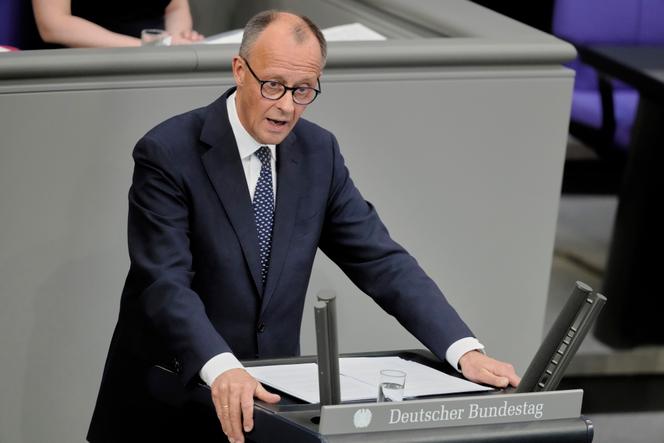


Western powers must not be divided in confronting Russia over the Ukraine war, German Chancellor Friedrich Merz said on Wednesday, May 14, urging a united stance between Europe and the United States. Merz, who took power last week, also pledged Berlin would build up its military to become "Europe's strongest conventional army" and play a greater role in NATO and the EU in the standoff with Moscow. "It is of paramount importance that the political West does not allow itself to be divided," the conservative Merz told parliament in his first major address as chancellor. "And therefore I will make every effort to continue to achieve the greatest possible unity between our European and American partners," he added, after two recent phone calls with US President Donald Trump.
His comments came as international efforts have gathered pace toward a Ukraine ceasefire and peace talks, with European allies backing calls for a 30-day freeze of hostilities. Ukrainian President Volodymyr Zelensky has urged Russian President Vladimir Putin to meet him in Turkey on Thursday, with no firm response so far from the Kremlin. Zelensky has urged Trump to help secure the meeting with Putin. Trump – who has become increasingly frustrated at the slow pace of talks – said on Monday that he was "thinking" about going to the talks.
Merz said that "in the past few days, I have spoken with President Trump twice by phone. I am grateful for his support of the initiative for a 30-day unconditional ceasefire." "Such a ceasefire can open a window in which peace negotiations become possible," he added.
Merz stressed that there must be "no dictated peace and no submission to militarily created facts against Ukraine's will." "We continue to vigorously support the attacked country Ukraine," he said, calling it "a joint effort of Europeans, Americans and other friends and allies."
The conservative leader harshly criticized Russia for launching its full-scale invasion of Ukraine over three years ago. "Russia has broken all the rules that have governed our coexistence in Europe since the end of World War II, and especially since overcoming the division of Europe," said Merz, adding: "The outcome of this war will determine whether law and order will continue to prevail in Europe and the world – or whether tyranny, military force and the sheer right of the strongest will prevail."
Merz on Wednesday urged all sides to avert a "famine" in Gaza. While reiterating that Germany stands by Israel's side, Merz also said that "we expect efforts for more humanitarian provision for the population in Gaza whose suffering we see, especially among children, women and the elderly." "It is a humanitarian obligation on all parties (...) and I stress, on all parties – that famine in the region be averted as soon as possible," Merz told parliament.
Merz said he hoped that there would be "successful negotiations for a ceasefire and the release of hostages" still being held by Hamas, including those with German nationality. Germany, which has long sought to atone for the Holocaust, has been a staunch supporter of Israel.
Merz pledged his government would build up the long-underfunded German military. "Strengthening the Bundeswehr is our top priority," Merz said. "The German government will provide all the financial resources the Bundeswehr needs to become Europe's strongest conventional army," he continued, adding: "This is appropriate for Europe's most populous and economically powerful country. Our friends and partners also expect this from us. Indeed, they practically demand it."
Merz added that "our goal is a Germany and a Europe that are so strong together that we never have to use our weapons. To achieve this, we will have to assume more responsibility within NATO and the EU."
He also reeled off a string of plans to revive the struggling economy. "We will do everything we can to put Germany's economy back on the path to growth," he said. "We can, through our own efforts, become a growth engine once again that the world looks up to with admiration."
A key plan of the new ruling coalition of Merz's conservative CDU/CSU bloc and the center-left SPD is to set up a fund to boost investment in infrastructure. The new government has agreed on investments of €150 billion for this purpose, Merz said. The fund is to be established after Merz succeeded in pushing changes to the country's strict debt rules through parliament, to allow greater borrowing. In addition, German firms will be offered tax breaks to invest in new equipment and corporate tax rates will be gradually reduced from 2028, he said.
Merz said he hoped to "prevent a prolonged conflict in the trade dispute with the United States," adding that cutting customs duties on both sides is "better than imposing tariffs against one another."
Merz, who has vowed to be a "very European chancellor," said Germany was proposing a new European Union "free trade initiative," noting that one in four German jobs depends directly or indirectly on foreign trade. When it came to China, Merz stressed it would remain an "important partner" but that he would keep on pursuing a policy of "strategic de-risking," aiming to reduce heavy economic dependencies on the world's number two economy.
